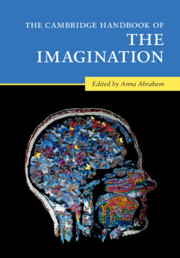Book contents
- The Cambridge Handbook of the Imagination
- The Cambridge Handbook of the Imagination
- Copyright page
- Dedication
- Contents
- Figures
- Contributors
- Acknowledgments
- 1 Surveying the Imagination Landscape
- Part I Theoretical Perspectives on the Imagination
- Part II Imagery-Based Forms of the Imagination
- Part III Intentionality-Based Forms of the Imagination
- Part IV Novel Combinatorial Forms of the Imagination
- Part V Phenomenology-Based Forms of the Imagination
- Part VI Altered States of the Imagination
- 40 Dreaming: Beyond Imagination and Perception
- 41 Dreaming is Imagination Roaming Freely, Based On Embodied Simulation, and Subserved by an Unconstrained Default Network
- 42 Aphantasia
- 43 Hypnosis and Imagination
- 44 Hallucinations and Imagination
- 45 The Psychiatry of Imagination
- 46 Meditation and Imagination
- 47 Flow in Performance and Creative Cognition – An Optimal State of Task-Based Adaptation
- 48 The Force of the Imagination
- Name Index
- Subject Index
- References
40 - Dreaming: Beyond Imagination and Perception
from Part VI - Altered States of the Imagination
Published online by Cambridge University Press: 26 May 2020
- The Cambridge Handbook of the Imagination
- The Cambridge Handbook of the Imagination
- Copyright page
- Dedication
- Contents
- Figures
- Contributors
- Acknowledgments
- 1 Surveying the Imagination Landscape
- Part I Theoretical Perspectives on the Imagination
- Part II Imagery-Based Forms of the Imagination
- Part III Intentionality-Based Forms of the Imagination
- Part IV Novel Combinatorial Forms of the Imagination
- Part V Phenomenology-Based Forms of the Imagination
- Part VI Altered States of the Imagination
- 40 Dreaming: Beyond Imagination and Perception
- 41 Dreaming is Imagination Roaming Freely, Based On Embodied Simulation, and Subserved by an Unconstrained Default Network
- 42 Aphantasia
- 43 Hypnosis and Imagination
- 44 Hallucinations and Imagination
- 45 The Psychiatry of Imagination
- 46 Meditation and Imagination
- 47 Flow in Performance and Creative Cognition – An Optimal State of Task-Based Adaptation
- 48 The Force of the Imagination
- Name Index
- Subject Index
- References
Summary
In the philosophy of dreaming, it is common to assume that dreams fall into one of two categories, which are thought to be mutually exclusive: Either they are quasi-perceptual phenomena, which is typically taken to imply they are hallucinations, or they are imaginative experiences. In this chapter, I propose that describing dreams as immersive mental simulations can help overcome this dichotomy, illuminating how dreams are both perception-like and deeply imaginative. Like standard waking experiences, dreams are here-and-now experiences of a virtual world centered on a virtual self. Like imagination, they are driven by spontaneous processes, marking a deep commonality with mental simulation in wakefulness, including mind-wandering and daydreaming. The sources of dreaming are similarly broad, spanning short- and long-term memories, ongoing concerns, and emotions, as well as illusory own-body perception during sleep. Understanding the commonalities between dreaming, perceiving and imagining without collapsing dreams into either category can enrich our understanding of our mental lives and forge new connections between philosophy and contemporary research on sleeping, dreaming, and mind-wandering.
Keywords
- Type
- Chapter
- Information
- The Cambridge Handbook of the Imagination , pp. 659 - 675Publisher: Cambridge University PressPrint publication year: 2020
References
- 1
- Cited by

